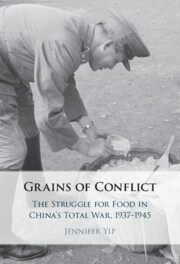
- Coming soon
- Publisher:
- Cambridge University Press
- Expected online publication date:
- June 2025
- Print publication year:
- 2025
- Online ISBN:
- 9781009601344
- Subjects:
- East Asian History, Area Studies, Asian Studies, Military History, History

China's war against Japan was, at its heart, a struggle for food. As the Nationalists, Chinese Communist Party, and Japanese vied for a dwindling pool of sustenance, grain emerged as the lynchpin of their strategies for a long-term war effort. In the first in-depth examination of how the Nationalists fed their armies, Jennifer Yip demonstrates how the Chinese government relied on mass civilian mobilization to carry out all stages of provisioning, from procurement to transportation and storage. The intensive use of civilian labor and assets–a distinctly preindustrial resource base– shaped China's own conception of its total war effort, and distinguished China's experience as unique among World War Two combatants. Yip challenges the predominant image of World War II as one of technological prowess, and the tendency to conflate total war with industrialized warfare. Ultimately, China sustained total war against the odds with premodern means: by ruthlessly extracting civilian resources.
‘One of the most important issues for China during its titanic war against Japan was food supply. Jennifer Yip’s superb book is the definitive account of how vital grains were provided to keep the Nationalist armies fighting. Deep research and revisionist arguments come together to make this a powerful and essential book for all students of China’s World War II.’
Rana Mitter - Harvard Kennedy School
‘Grains of Conflict addresses an underappreciated yet fundamental aspect of the Sino-Japanese War. Jennifer Yip’s insightful analysis of the Nationalist Chinese efforts to extract grain from the countryside to feed its soldiers reveals a critical aspect of the war that underpinned the Chinese victory.’
Peter Worthing - Texas Christian University
Usage data cannot currently be displayed.